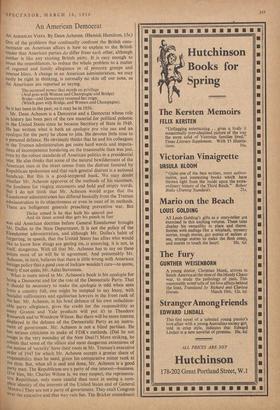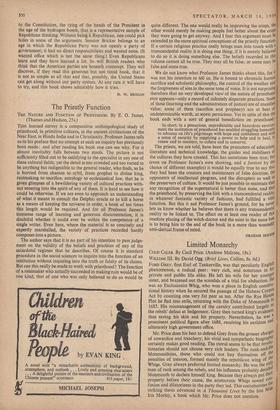An American Democrat
ONti of the problems that continually confront the British com- mentator on American affairs is how to explain to the British reader that American parties do differ from each other, although neither is like any existing British party. It is easy enough to stress the resemblances, to reduce the whole problem to a matter 9I! regional and family allegiance or of pressure groups and interest blocs. A change in an American administration, we may easily be right in thinking, is normally no skin off our nose, as the Americans are reported as saying.
The accursed power that stands on priVilege (And goes with Women and Champagne and Bridge) Broke—and Democracy resumed her reign; (Which goes with Bridge, and Women and Champagne).
So it has been in the past; so it may be in 1956.
Mr. Dean Acheson is a Democrat and a Democrat whose role in history has been part of the raw material for political polemic in the United States since he became Secretary of State in 1949. He has written what is both an apologia pro vita sua and an apologia for the party he chose to join. He devotes little time to a personal defence. He obviously thinks that he and his colleagues in the Truman administration got more hard words and imputa- tions of incompetence bordering on the treasonable than was just, even by the robust standards of American politics in a presidential Year. He also thinks that some of the natural bewilderment of the American man in the street oomes from the distrust fostered by Republican spokesmen and that such general distrust is a national handicap. But this is a good-tempered book.. We may doubt Whether Mr. Acheson approves of the methods of his successor, the fondness for ringing statements and bold and empty words. But I do not think that Mr. Acheson would argue that the
Eisenhower administration has differed basically from the Truman administration in its objectiveness or even in most of its methods. There are belligerent generals preaching preventive war. But Thrice armed is he that hath his quarrel just And six times armed that gets his punch in fust was old American doctrine before General Eisenhower brought Mr. Dulles to the State Department. It is not the policy of the Eisenhower administration, and although Mr. Dulles's habit of forgetting, in speech, that the United States has allies who would
like to know how things are getting on, is annoying, it is not, in Itself, dangerous. With all that Mr. Acheson has to say on these Points most of us will be in agreement. And presumably Mr. Acheson, in turn, believes that there is little wrong with American foreign policy that a good case of lockjaw wouldn't cure—to quote, nearly if not quite, Mr. Adlai Stevenson.
What is more novel in Mr. Acheson's book is his apologia for being a Democrat and for the role of the Democratic Party. That it should be necessary to make the apologia is odd when seen I rem a country full, one might be tempted to say lousy, with Socialist millionaires and egalitarian lawyers in the front rank of the bar. Mr. Acheson, in his brief defence of his own unfashion- able party • allegiance, gives the credit (or the responsibility as itianY Groton and Yale products will put it) to Theodore Roosevelt and to Woodrow Wilson. But there will be more interest displayed in the defence of the Democratic Party as an instru- ment of government. Mr. Acheson is not a blind partisan. He has serious criticisms to make of FDR's methods. (Did he not resign in the very noonday of the New Deal?) More striking, he admits that some of the silliest livid most dangerous extensions of the notion of 'security' have their roots in Mr. Truman's executive order of 1947 for which Mr. Acheson accepts a greater share of responsibility than he need, given his comparative minor rank at the time. But, when all is said and done, Mr. Acheson is a good Partyman. The Republicans are a party of one interest—business. (For him? Mr. Charles Wilson is, we may suspect, the representa- tive Republican, only more candid than most in seeing a com- plete identity of the interests of the United States and of General hiotors.) They are not a party of government. They exalt Congress Over the executive and that way ruin lies. The Bricker amendment
to the Constitution, the tying of the hands of the President in the age of the hydrogen bomb, that is a representative sample of Republican thinking. Without being a Republican, one could pick holes in some of the arguments. Senator Bricker belongs to an age in which the Republican Party was not openly a party of government; it had no direct responsibilities and wanted none. (It wanted office which is not the same thing.) Even Republicans learn and they have learned a lot. So will British readers who think that the American parties are beneath contempt. They will discover, if they read this generous but not timid book, that it is not as simple as all that and that, possibly, the United States can get along without our party system. At any rate it will have to try, and this book shows admirably how it tries.
D. W. BROGAN



































 Previous page
Previous page